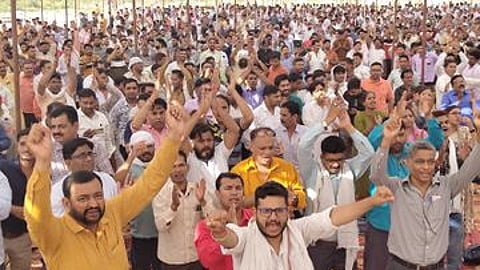
Jaipur- The Rajasthan state government is facing fierce opposition from various employees' associations over its recent decision to screen employees with over 15 years of service or those aged 50 and above for compulsory retirement.
The directive, aimed at rooting out those deemed corrupt, non-performing, incompetent, or ineffective, has sparked significant unrest among the state workforce.
The Department of Personnel (DOP) issued the contentious order, which allows for the granting of compulsory retirement through a three-month notice or an advance salary/allowance of three months, as per the Rajasthan civil service rules.
In a display of unified resistance, employees' associations across the state have threatened to launch a statewide agitation if the government proceeds with the implementation of this order.
The associations argue that the current administration is instilling fear among employees by issuing new orders daily, creating an atmosphere of intimidation and uncertainty.
Employees have indicated that they anticipate any proceedings to commence soon after the Lok Sabha results declaration. The unions, likewise, are on standby, eagerly awaiting any such move by the government. Should any adverse action be taken, they have affirmed their readiness to respond promptly.
The employees' fierce opposition has rekindled memories of Rajasthan's longest strike during early 2000s.
The situation evokes memories of the longest agitation in Rajasthan's history, which took place in 2000. During that period, services were crippled, and work came to a standstill for over two months. The agitation had its roots in pay discrepancies and a perceived lack of responsiveness from the Ashok Gehlot-led Congress government, which came to power in 1998.
The period from 1998 to 2003 was marked by widespread employee dissatisfaction, strikes, and stringent government measures.
In 1999, the movement was initiated by ministerial employees and Patwaris, escalating into large-scale protests and hartals that evolved into Mahapadaav.
Employees complained that the Gehlot government was unresponsive to their demands, leading to prolonged strikes.
The Patwaris' strike lasted for 88 days, the ministerial staff's strike for 64 days, and the teachers' strike for 38 days. During this time, striking employees even faced salary deductions, adding to the tensions. The strike had crippled various government services, including water supply, sanitation, medical and health services, and the courts. It took several weeks for the backlog to be cleared, and for everyday affairs to return to normalcy.
Interestingly, few may remember that in December 2019, the then Chief Minister Ashok Gehlot had also advocated for compulsory retirement for corrupt and negligent officers and employees.
While launching housing schemes for teachers and policemen, CM Gehlot had stated that officers and employees who perform well should be encouraged, while it is necessary to take strict measures such as compulsory retirement for negligent officers and employees.
CM Gehlot emphasized that it is not appropriate to treat hardworking and negligent employees the same way, as it fosters a sense of disillusionment among the hardworking individuals. Regardless of their rank, everyone should fear the possibility of losing their job if they do not perform their duties.
Employees union are strongly voicing against the compulsory retirement order issued by the state government. Labeling it as an attempt to terrorize employees and an anti-people conspiracy aimed at dismantling employment, the unions are demanding the immediate withdrawal of this "irresponsible" directive.
The Mooknayak reached out to some of the union leaders who said that the compulsory retirement order has left state employees feeling shocked, hurt, and angry.
Gajendra Singh Rathore, State President of the All-Rajasthan State Employees Joint Federation (Unified), stated, "The government imposes new restrictions on employees daily but does nothing for their welfare. Instead of addressing long-standing pay discrepancies and other demands, the government instills fear in employees."
Mahaveer Sharma, President of the All Rajasthan State Employees Joint Federation, added, "The government's review process is undermining the respect and dignity of employees."
Siyaram Sharma, the State Administrative President of Rajasthan Teachers' Union (Siyaram), has openly criticized the new order. He asserts that the directive will be misused to suppress state employees.
"The ministers and many leaders of the ruling party are constantly spewing venom against the employees," Sharma remarked. He also highlighted the Chief Minister's recent interview, where he mentioned that actions would be taken according to the compulsory retirement rules, exacerbating the fear and discontent among state employees.
State President of Rajasthan Teachers' Association, Virendra Sharma, and State Chief General Secretary, Naveen Kumar Sharma, both stated that the government’s true aim is to privatize public institutions of education, medicine, and public service. They claim that by reducing the size of government departments and targeting employees, the government is trying to prevent organized protests against these policies.
Joint secretary Arun Vyas said, if the government does not cease its campaign against them, the state employees will take to the streets in protest and work to inform the public about the government's "conspiratorial steps."
Shambhoo Singh Mertiya, District President of the Rajasthan Panchayatiraj Karmchari Mahasangh-Jodhpur, emphasized, "This order sounds ridiculous especially at a time when hundreds of prosecution permissions are pending at the government level. Many of the officers are being trapped red-handed by the ACB daily, what about them?" Representing over 1.75 lakh Panchayat Raj employees across the state, Mertiya's association has sent a memorandum to the Chief Minister, urging the immediate withdrawal of the order. He warned, "Agitation would be the last resort."
Praveen Charpota, associated with the Rajasthan Nursing Association, conveyed, "The Mahasangh of nursing staff at Jaipur has expressed and conveyed its resentment. Government's move is not at all acceptable. Since it's not just targeted to nurses or the medical department but all departments encompassing lakhs of employees, this is a larger issue, and we all will stand united."
You can also join our WhatsApp group to get premium and selected news of The Mooknayak on WhatsApp. Click here to join the WhatsApp group.